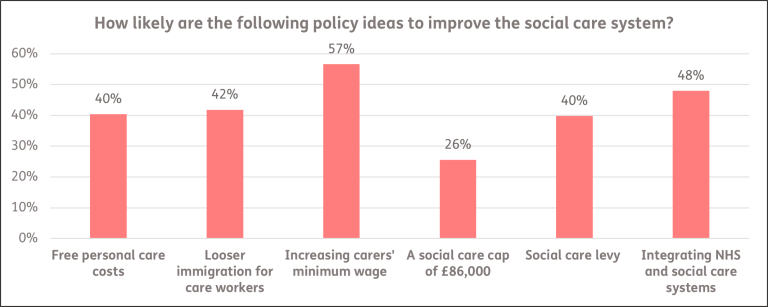Following the recent decision by Chancellor Rachel Reeves to abandon the planned £86,000 cap on lifetime personal care costs, attention has shifted to how the government may seek to reform the sector. A new study by retirement specialist Just Group has revealed public opinion on potential changes to social care, suggesting that voters favour different measures.
The research, conducted prior to the General Election, surveyed public attitudes towards various reforms, including the care cap that was initially set to be introduced by the previous Conservative government in October 2025. Instead, a significant portion of respondents said they believed increasing the minimum wage for care workers would have the greatest impact on improving the social care system. This preference echoes Labour’s manifesto pledge to create a fair pay agreement for adult care workers in order to address recruitment challenges and ease the burden on the NHS.
The study found that 42% of respondents also supported more relaxed immigration rules for care workers to help fill the estimated 130,000 vacancies in the sector. This comes in light of Home Office data showing an 80% drop in applications for UK visas in the health and social care sector last month compared to the same time last year.
In contrast, the option that received the least support from voters was the care cost cap. Despite being a recommendation from an independent commission back in 2011, the proposed lifetime cap on personal care costs has been met with delays and has now been cancelled by the current Chancellor. This is despite Wes Streeting, the new Health Secretary, previously indicating during the election campaign that it would go ahead under a Labour government.
Another policy gaining traction among voters is the Liberal Democrats’ promise of free personal care, which two-in-five (40%) respondents said would likely improve the system. The proposal aims to eliminate out-of-pocket care costs for individuals needing assistance with daily tasks.
Stephen Lowe, group communications director at Just Group, noted that the public’s lack of enthusiasm for the care cap likely stems from a perception that it would do little to address the overall quality of the social care system. “The social care cap was intended to protect individuals from catastrophic costs,” Lowe explained, “but voters seem to believe it won’t solve the broader problems within the sector.”
The research also showed that a majority of voters would be willing to contribute more in taxes to improve the quality of social care. Over half (54%) said they would support either a general tax increase or a ring-fenced social care levy amounting to a 1.25% rise in National Insurance. This willingness was particularly pronounced among younger voters, with 52% of those aged 18-34 and 50% of those aged 35-49 in favour of paying more for better care services.
The desire to improve care quality was even stronger among those with personal experience arranging care for a parent or in-law, with 70% and 75%, respectively, indicating they would support higher taxes to secure better services.
However, the research also highlighted public scepticism about whether any government could deliver meaningful social care reform. Nearly six in ten voters believed that an effective social care system would not be achieved in the next term, regardless of which party was in power. As Lowe observed, “Given the scrapping of the care cap, the question now is whether this government will present a credible policy that the public can trust to improve social care.”



